Summer Reading Camp | Guest Readers | Reading Intervention | Experiential Learning | Weekly Reading | Decoded
Summer Reading Camp
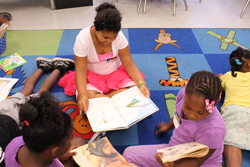
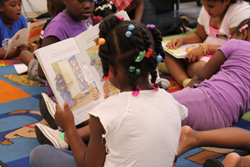
The Reading Explorers Summer Camp is an intensive summer program designed to improve reading scores and combat summer learning loss. The camp enhances students’ experiences with reading and writing through content-rich instruction focused on the core elements of reading: vocabulary, comprehension, writing, phonics, and fluency and experiential learning opportunities.
Morning Sessions
Classes are led by certified teachers who care passionately about child development. Low student-teacher ratios ensure Explorers receive the attention they need and deserve.
A unique characteristic of the program is the involvement of guest readers. Positive role models play an important role in children’s identity development and aspirations. Each day, guest readers from the community share a read aloud with Explorers, modeling what it looks and sounds like to achieve reading excellence.
Afternoon Sessions
As a means to reinforce morning instruction, students are invited to participate in a wide array of fun, hands-on activities. The afternoon portion of the Reading Explorers program seeks to capture each child’s imagination as they are transported to Planet Koob (book spelled backward), where the robot inhabitants must read to breathe and stay alive. Characters such as E2R2 (Edwards Elementary Reading Robot) and Sparky the dog are tied to weekly themes to help students develop and improve twenty-first-century skills such as collaboration, communication, critical thinking and creativity.
Weekly Reading

The Weekly Reading program provides students with consistent, tailored and individual instruction centered on improving student reading and reading comprehension skills to ensure students are able to master reading benchmark tests at the end of the third grade. The program, piloted at Edwards Elementary, gives first through third grade Explorers the opportunity to learn at their independent reading level alongside a caring adult and supported by research-informed tools designed to match and challenge their current reading level.
How It Works
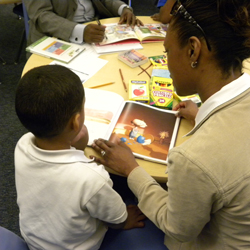
Each week, 75 employees from SandRidge Energy and Public Strategies spend an hour meeting one-on-one with Explorers. Reading Coaches enter their sessions armed with a kit, including a weekly lesson from the research-based Learning A-Z curriculum, an iPad loaded with educational games and applications, and art and writing supplies. Each lesson is composed of a reading comprehension component and a supplemental phonics or fluency lesson, depending on the student’s reading level. Students spend 45 minutes working diligently on their assigned lesson and then are given the final 15 minutes to play educational, reading-themed games on the iPad.
A full-time Program Specialist closely monitors reading sessions, conducting all assessments and evaluating student progress. The Program Specialist also provides training for the volunteers at intermittent times throughout the school year and aligns the entire program with best-practice standards.
About Learning A-Z
Learning A-Z is a research-informed literacy curriculum that provides easy-to-use tools for coaches, guidance about progress monitoring for staff, and high-quality student resources that allow children to engage with the materials. Further, one component of the curriculum, RAZ Kids, provides students, teachers and parents additional opportunities to practice building student literacy skills in school, during coaching time and at home.
Using the Learning A-Z Running Records tool, the Program Specialist conducts ongoing evaluations of each student’s reading ability, which is used to identify their “just right” reading level (Level aa – Level z). This assessment is conducted monthly to monitor the student’s progress as he/she moves through the levels. As a result, Reading Coaches are able to visually see results from their weekly investment of time.
Guest Readers
When camp is in session, every morning Explorers gather to spend time with a Guest Reader. Guest Readers are selected from a wide range of professional backgrounds to serve as role models for the Explorers and inspire them to read.
2013 Book List
Additionally, Guest Readers have the opportunity to spend time with a group of children investing their summer in learning and to see a project committed to impacting the summer learning loss that would inevitably occur for students if the camp did not exist.
2012 Guest Readers

Sandino Thompson
June 10th, 2013
Executive Director of It’s My Community Initiative
 Rev. Tony Wise
Rev. Tony Wise
June 11th, 2013
Pastor of Voice of Praise Baptist Church
 Lynne Hardin
Lynne Hardin
June 12th, 2013
OKCPS Board Chair
 Anna King
Anna King
June 13th, 2013
Oklahoma PTA State President
 Rita Freeney
Rita Freeney
June 14th, 2013
Organizer of Sisters In Motion
 Barbara Davis
Barbara Davis
June 17th, 2013
Douglass Middle-High School Principal
 Chief J. Kevin Berry
Chief J. Kevin Berry
June 18th, 2013
Oklahoma City Fire Dept Public Education
 Ruth Veales
Ruth Veales
June 19th, 2013
District 5 - School Board Member
 John Pettis, Jr
John Pettis, Jr
June 20th, 2013
Ward 7 Councilman
 Coach Willis Alexander
Coach Willis Alexander
June 21st, 2013
Douglass Middle-High School Athletic Director
 Karen Jacobs
Karen Jacobs
June 24th, 2013
Coordinator of OkDHS Office of Community and Faith Engagement
 Carole Brown
Carole Brown
June 25th, 2013
Coordinator
Parent Resource Center at Metro Career Academy, Metro Tech
 T.W. Shannon
T.W. Shannon
June 26th, 2013
Oklahoma House Speaker
 Oscar Jackson
Oscar Jackson
June 27th, 2013
Retired State Official
 Rickey Thomas
Rickey Thomas
June 28th, 2013
Associate Pastor of St. John Missionary Baptist Church
 Boston Snowden
Boston Snowden
July 1st, 2013
Oklahoma Author
 Corey Hill
Corey Hill
July 2nd, 2013
Assistant Director, Student Development at OCU

Monique Bruner
July 3rd, 2013
Professor of Political Science and Coordinator of the Reach Higher (Adult Degree Completion) Program

Holiday - No Camp
July 4th, 2013
 Angie Burris
Angie Burris
July 5th, 2013
Registered Nurse with Logan County Health Dept.
 Larry Hawkins
Larry Hawkins
July 8th, 2013
Director, Downtown Business Campus for Metro Tech
 Bob Hammack
Bob Hammack
July 9th, 2013
President/CEO New West Group
 Cresha Redus
Cresha Redus
July 10th, 2013
Project Manager at Public Strategies
 Shamia Jackson
Shamia Jackson
July 11th, 2013
Behavioral Health Rehabilitation Specialist with Neighborhood Strategies
 Dr. Gilbert Oliver
Dr. Gilbert Oliver
July 12th, 2013
President of Okc Metro Alliance of Black School Educators
Reading Intervention
What if a camp focused many of its activities on helping children learn to read?
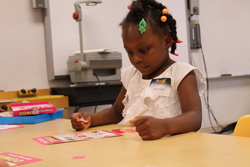
Welcome to Reading Explorers! For morning sessions, Monday through Thursday, students are assigned to homeroom classrooms of approximately 15 Explorers. Small class sizes give certified teachers, and their partner Camp Assistants, the opportunity to execute the most focused instruction possible.
Each day is divided into instructional blocks. During the 2.5-hour morning block, teachers focus on reading comprehension skills with engaging text. Through targeted phonics instruction, introduction to key vocabulary terms and repeated fluency practice, each student is receiving the intervention needed not only to prevent summer learning loss, but to prepare the student for the upcoming grade.
Assessing Progress
As the summer progresses, teachers and education leads use data to set reasonable growth goals, determine Students' progress along the way and celebrate accomplishments.
Explorers' reading growth is measured through a variety of tools and assessments, most notably the Gates-McGinitie Reading Test. Through a unique partnership with the Oklahoma City Public Schools District, the Gates-MacGinitie Reading Test is administered three times throughout the school year: once at the beginning of the fall semester, once mid-year, and again at the end of the school year. The test examines five language and reading abilities, including literary concepts, oral language concepts, letter recognition and letter-sound relationships.
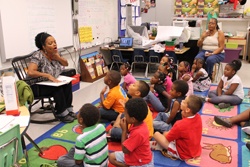
Additionally, teachers obtain ongoing progress monitoring information through DIBELS as well as tools obtained from the Learning A-Z network. This information provides teachers with the opportunity to strategically plan and use the most up-to-date information regarding each Explorer’s challenges and levels of mastery. This information is used to place Explorers in learning groups reflective of their current literacy stage as well as identify where they need the most assistance and the small steps that have been accomplished along the way.
Experiential Learning
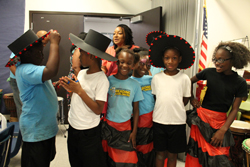
Experiential education is a philosophy emphasizing the importance of learning activities to take place outside of the traditional classroom setting. Learning objectives are carefully planned and articulated prior to the experience; however, Explorers are also encouraged to discover new and exciting information beyond such expected outcomes. The Reading Explorers flourish during this time and are provided opportunities for learning and engagement that many would not otherwise have the opportunity to experience.
Afternoons are filled with skill-building opportunities and hands-on experiences, including field trips, visiting experts, and guest presentations. Explorers are divided into Activity Teams, with each team being named after a historical African American author (learn more about our Activity Teams).
About Project-Based Learning
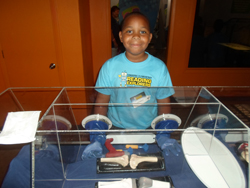
With an emphasis on experiential learning, Reading Explorers partake in project-based learning. This model emphasizes the organization of learning around complex, collaborative projects. These projects often involve the perspective and planning of Reading Explorers in order for them to gain the most possible skill development in problem-solving, decision making, and investigating. Often, the students work autonomously, with limited direction from adult leads. This allows them the creative opportunity to create products and presentations they are proud to share with others.
Each week ,the Reading Explorers learn and practice Twenty-First Century skills such as communication, collaboration, critical thinking and creativity. During the weekly Assembly of Koob, students learn the history of Planet Koob through storytelling, puppets and guest presenters. The rest of the week, Reading Explorers are engaged in multidisciplinary activities that include Capoeira, Abrakadoodle, Teambuilding and Project-Based Learning.
About Capoeira
Capoeira is an African-rooted Brazilian art form that combines dance, acrobatics, music and self-defense. Historians agree that enslaved Africans used capoeira's game-like appearance to disguise self-defense training. Reading Explorers learn capoeira fundamentals from Oklahoma City-based instructor Will Rose, who emphasizes technique, history, protocol and collaboration.
About Abrakadoodle
Abrakadoodle is a comprehensive art education company that offers visual arts classes. Abrakadoodle created thematic learning experiences for the Reading Explorers that included painting, sculpture, collage and paper art. The Abrakadoodle program helps Reading Explorers develop self-confidence, creativity, and social and critical thinking skills.
About Teambuilding
Teambuilding creates opportunities for the Reading Explorers to practice communication and collaboration. Norman-based instructor Bronson Baker designed an experiential learning curriculum that combines problem solving, teamwork and community engagement through kinesthetic activities. Students also participate in a service learning project where they refurbish several flowerbeds and planted flowers and various seeds to help beautify the school grounds.
Decoded
Reading Explorers: Decoded is designed to stimulate students’ interest in reading by merging technology and literacy. In 2012, 18 first- through third-grade students at Edwards Elementary participated in the program, which was provided through an Innovation Grant from Creative Oklahoma, with additional support from SandRidge Energy.
Volunteer reading coaches encouraged students to select their favorite books to summarize and recommend to others, which helped to improve the Explorers’ comprehension and writing skills. Videos were produced that feature each book, including illustrations and reasons for the student’s recommendation.
All students at Edwards can benefit from the project when they visit the school’s library. Each book in the Decoded Collection was assigned a Quick Response code—a type of matrix barcode that, when scanned, links to a video that describes the book. These videos allow students to preview the books in a visually appealing way.
2012 Reading Explorers: Decoded Videos





































